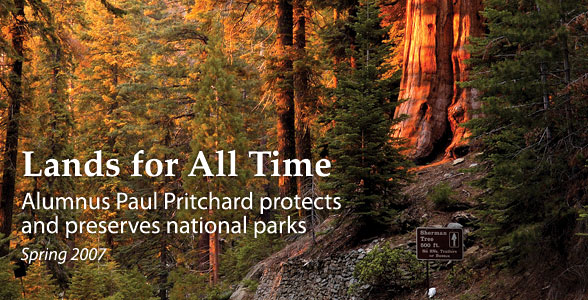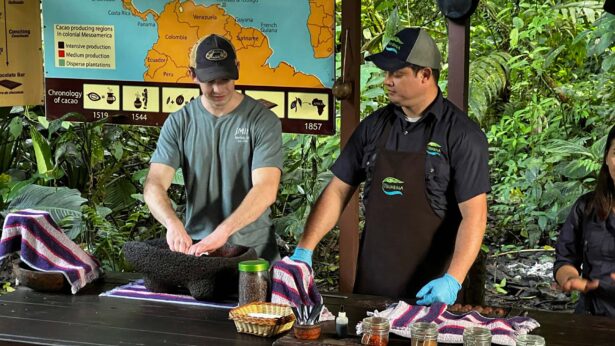If you could look at mountains and seashores and think I saved that, wouldn’t you nearly pop with pride?
Paul Pritchard (Knoxville ’71) can say that. He has helped preserve nature’s best for future generations. Pritchard is the founder and president of the National Park Trust. His fingerprints are on more than half of America’s national parks, and he hasn’t stopped at the U.S. border: he helped in the founding of China’s national parks, as well. Noted conservationist Michael Frome has called the UT planning graduate one of the most influential conservationists of modern times. The Smithsonian Institution recognized him in its book, Conservation Leaders.
Pritchard relinquished administrative responsibilities at NPT last fall but continues as president. He isn’t about to sit down and take it easy. “My future will still very much be tied to conservation. I don’t see how I could ‘retire’ knowing all I know.” He knows, in particular, how much work remains. “NPT has completed more than two hundred parkland protection projects and finished five national units,” he says. “We’re proud of our successes but realize that there is much more that needs to be done.”
Pritchard founded NPT in 1983 when the secretary of the interior, James Watt, discontinued the acquisition and protection of lands privately owned and located in and around national parks. Today NPT continues to be the only land conservancy dedicated to preserving America’s national parks, wildlife refuges, and historic monuments.
When Pritchard talks about “finishing” a national park, your brow may furrow in puzzlement. Aren’t parks “finished” when they’re founded? Negative, Pritchard says.
“Congress creates proclamation boundaries. But wildlife habitats may change or historical sites may be uncovered, so Congress can change those boundaries.” Acquiring the additional lands, either through donation or purchase, is NPT’s business. NPT gives the lands to such organizations as the National Park Service to preserve and manage.
“We raise money and buy property, or we may help others do it. We don’t seek or accept government money. We’re largely dependent on private donations,” Pritchard says. “We work through volunteers and land trusts. We’re focused on doing one thing, doing it well, and doing it quietly–if we’re too noisy, it drives up the price of property.”
The trust worked with a donor to purchase a beach that protects the shoreline of a National Marine Sanctuary adjacent to the Virgin Islands National Park on St. John. The trust helped preserve Abraham Lincoln’s boyhood home in Kentucky, which became a National Historic Site. And in one of the most unusual cases, in 2005 NPT transferred ownership of Tallgrass Prairie National Preserve to the Kansas Park Trust, concluding its 11-year ownership of the nation’s first and only privately owned National Park unit.
For decades preservationists and politicians wanted to create a national park in the Flint Hills of Kansas, the last remaining stand of tall-grass prairie in North America. Opposition to federal land ownership stalled legislation until U.S. Senator Nancy Kassebaum Baker (wife of 1949 UT graduate and former U.S. senator Howard Baker) brokered a compromise stipulating that the federal government couldn’t own more than 180 acres and requested that the National Park Trust own the remainder of the preserve as a private party.
The public lands Pritchard and NPT have helped preserve are a kaleidoscope of America’s most striking landscapes–Point Reyes National Seashore, California; Gettysburg National Military Park, Pennsylvania; Craters of the Moon National Monument, Idaho; and Sequoia National Park, California, to name a few. Projects are underway in the Rocky Mountain National Park and at sites in Delaware, Arizona, and West Virginia.
Pritchard’s entire career has been in the public sector. He grew up in Kansas City, graduated from the University of Missouri, and served in Vietnam. When he came home, he chose UT’s planning program for graduate work. “There was a lot of talent in that program. I remember Walter Shouse, Joe Petraska, and my adviser, A. J. ‘Flash’ Gray.”
 Before graduating in 1971, Pritchard did his master’s thesis on then-governor Jimmy Carter’s reorganization of Georgia state government. The Carter camp took notice and offered the young Pritchard a job reorganizing some of Georgia’s transportation agencies, such as Atlanta’s MARTA and the Georgia ports. “I was the liaison between the government and the people involved,” Pritchard says. “The human-interaction skills I learned at UT definitely helped.”
Before graduating in 1971, Pritchard did his master’s thesis on then-governor Jimmy Carter’s reorganization of Georgia state government. The Carter camp took notice and offered the young Pritchard a job reorganizing some of Georgia’s transportation agencies, such as Atlanta’s MARTA and the Georgia ports. “I was the liaison between the government and the people involved,” Pritchard says. “The human-interaction skills I learned at UT definitely helped.”
Next he found himself the chief of the Georgia natural resources agencies with an office just one floor beneath Carter’s. “If he stomped his foot, I came running,” Pritchard chuckles. In this position, he started the Georgia Heritage Trust, which the Nature Conservancy copied. “Jimmy Carter allowed me to work on legislation about coastal zones, working with the National Oceanic and Atmospheric Administration [NOAA].”
Pritchard’s next job was with NOAA, followed by a stint as head of the Appalachian Trail Conservancy. When Carter ran for president, Pritchard managed his campaign in West Virginia and northwestern Virginia. He got to know the Carters well, and after Jimmy Carter was elected he appointed Pritchard head of the Bureau of Outdoor Recreation, part of the National Park Service. “There were six hundred staff architects and a budget of over a billion dollars a year,” Pritchard recalls.
In 1980 he was elected president of the National Parks and Conservation Association. Under his guidance, the association grew to 500,000 members and contributed substantially to establishing new parks. When the National Park Trust was spun off in 1997, Pritchard went with it.
His accomplishments on behalf of American public lands have been punctuated by work with marine parks. Pritchard says that when he was with NOAA, the idea of marine parks began to gain ground. He was instrumental in founding the nation’s first estuarine sanctuary, located in Coos Bay, Oregon. He also instigated planning for Dry Tortugas National Park in Florida.
“In one of my conversations with James Watt and his staff, including Donald Hodel, I suggested that Watt could designate a new marine national park surrounding Fort Jefferson [a 19th-century fort 70 miles from Key West]. I was told by Bill Mott, the NPS director, that this discussion led to the designation [of the Dry Tortugas National Park].” The park, which includes seven small islands, protects not only the fort but also reefs, sea life, and birds.
Pritchard’s expertise has led him to work also with national parks in other countries. When China’s park agency wanted ideas and information, Pritchard was the point person for the U.S. “I’ve made five trips to China. We brought together experts–resort developers, architects, and park professionals–and visited their parks and gave suggestions. We advised them to concentrate commercial activities much like Yosemite has done in its Central Valley.
“The Park Service now has a working relationship with China, and the Chinese parks are marvelous. I’m very proud of that.” Pritchard has also worked on parks in Ireland, France, and the former Yugoslavia.
He says the business of conservation is getting more and more expensive. When NPT transferred the Tallgrass National Preserve, Pritchard said demand for lands within or adjacent to national parks was making the cost of preservation higher than ever before, straining the financial resources of conservation groups who must vie with real estate developers and private industry for ownership of at-risk open spaces.
“Most people are not aware that civilization is quickly encroaching on land that is located either inside the boundaries or right next door to state and national parks,” he says. “Once these lands are developed or exploited for their natural resources, there is no going back.”
He says he doesn’t have a favorite among the parks–“each is superlative in its own way.”
Pritchard credits UT for preparing him for his career. “I’m very proud of my University of Tennessee experience,” he says. “A lot of my life has evolved from that great public-university experience.”
He is optimistic that, despite serious challenges, the best is yet to come for America’s national parks. “Our parks are a manifestation of the conservation commitment of our people, but we’ve taken that heritage for granted. People have to get involved. The children of Tennessee and North Carolina raised pennies to establish the Great Smoky Mountains National Park. I’m optimistic that kind of spirit will re-emerge and see us through.”
For the Public Good
As Paul Pritchard sees it, America’s commitment to its defining institutions–such as national parks–is at a low ebb. “There’s a change in commitment to institutions such as public education. There’s no funding today for acquisition of parklands; other programs are reduced or eliminated. These things aren’t just budgetary reductions. They’re changes in society.”
It’s not about politics or politicians, he says. The founding fathers of American conservation, Theodore Roosevelt chief among them, were politically conservative, “but I don’t think these programs are ‘liberal’ or ‘conservative.’ They’re core programs of our society. We’re in a very down time about public programs–things I think have made this country great.
“For instance, I’m a veteran [of the Vietnam War], and I think the military is getting a lot of poor treatment. But in the end, I think we’ll elect people who will improve education and the military. But in conservation–you can’t reclaim farmland after it’s been subdivided. A number of our parks aren’t finished. Some are in danger of being cut in half by development. The government can’t or won’t buy the land. If you give these things up, you give them up for all time.
“The Virgin Islands [National Park in St. John] is an example. We can’t stop the subdivisions for the wealthy, a lot of whom are from other countries.”
Pritchard believes when Americans become concerned enough, they’ll rally to the rescue of public institutions. “It has to start with the people. Just a change in Congress won’t do it. Solutions don’t come from Washington. If citizens raise issues, politicians will respond. There has to be a dramatic change.”



